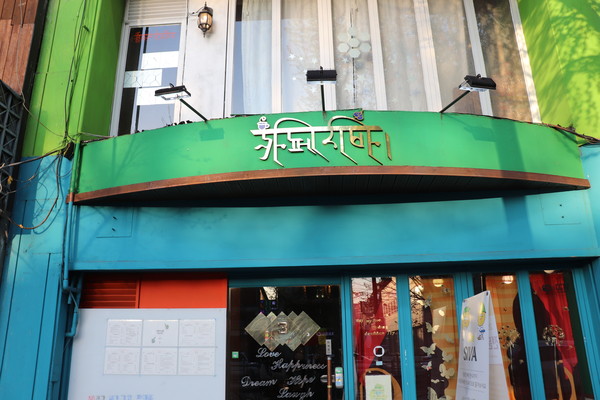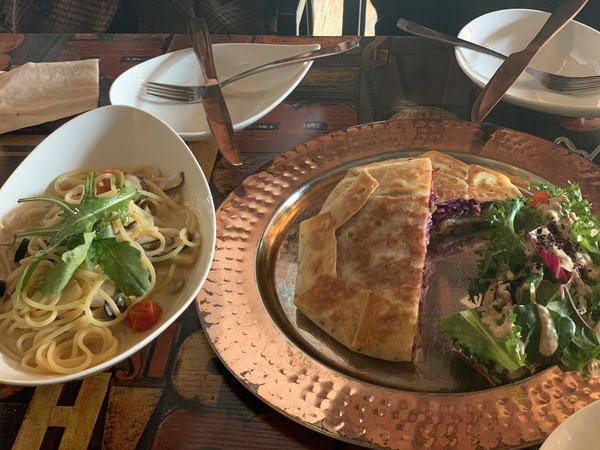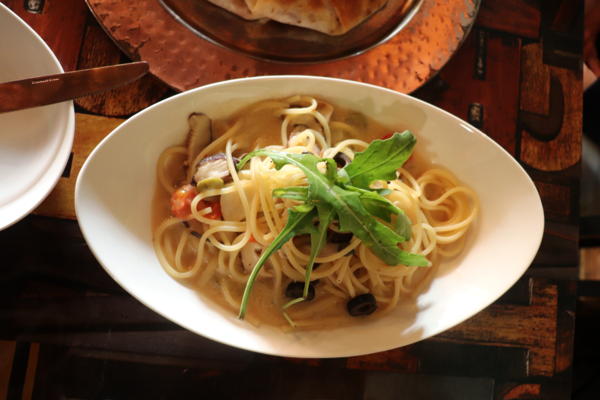"Why don't you eat this? It's delicious." "What made you decide to become a vegetarian?" "Don't you have any inconvenience for meals?" "Give this a try, just once." For a vegetarian, these words are often heard at the dinner table. After deciding to become a vegetarian, eating meals outside the home with others became uncomfortable situations. The vegetarian, nevertheless, vows not to break her promise to herself and the beliefs she set. Still, it is upsetting when others continuously nag about eating habits at the dinner table. The vegetarian is forced frequently to reply with, "This is the lifestyle I've chosen."


What does vegetarian mean?
A quick look on Google Trends clearly shows that people are interested in this lifestyle with the high number of keyword searches. Soaring number of searching "veganism", in particular, means society's interest in various types of vegetarians has grown. According to the International Vegetarian Union, the number of vegetarians worldwide is estimated at 180 million (as of 2017). Given the recent trend to live some form of vegetarian lifestyle, the number of vegetarians is expected to grow in years to come. Canada and China have even encouraged vegetarianism at the governmental level. Interest in a vegetarian lifestyle and the number of vegetarians are increasing, and there are several reasons for these trends. Some people opt for a vegetarian diet for health and religious reasons. Others avoid eating meat for ethical reasons as animal cruelty in the livestock process, which violates animal rights and destroys the environment. Although the number of vegetarians and interest in vegetarianism is increasing, not much is known about vegetarianism, especially in Korea.
"Vegetarianism" refers to a diet that is comprised all or mostly of vegetables. In other words, not every vegetarian eats only vegetables. There are different types of vegetarians. A 'fruitarian' is at the extreme end. These people only consume fruit and nuts. They refused to eat roots and even the leaves of plants. They only eat fruit and grains. 'Vegan' is probably the most familiar term for most Korean. These people refuse to eat all types of meat, including food from animals such as milk, eggs, and honey. They also do not eat fish, and they only eat vegetables. A 'lacto-vegetarian' does not eat meat, fish, shellfish, and animal eggs, but they do drink milk and eat dairy products and honey. Next, an 'ovo-vegetarian' does not eat meat, fish, seafood, and dairy products, and does not drink milk while they do eat eggs. A 'lacto-ovo-vegetarian' refers to vegetarians who eat food from animals such as eggs, milk, and honey, but do not the animal itself. A 'pesco-vegetarian' refers to vegetarians who eat dairy, poultry eggs, and fish, and a 'polo-vegetarian' is a vegetarian who eats milk, eggs, fish, and chicken. Last, a 'flexitarian' is a semi-vegetarian who occasionally eats meat. SMT reporters tried to live as 'vegan' for one day joining the meaningful movement of protecting animal rights.

Healthier food, better food
Some vegetarian cafés and restaurants have sprung up near Sookmyung Women's University. SMT reporters decided to go to Café Civa that offers guests various kinds of vegetarian dishes. The Café is located near Exit 6 of Sookmyung Women's University Station. As soon as SMT reporters entered the Café, they took note of the warm green interior, the yoga-related books around the café, and other interior decorations. The Café offered customers a wide range of vegan cuisines. Words such as animal protection, environmental protection, and naturalism were clearly written on the menu, highlighting the eatery’s theme. Reporters chose a meal that would give them a wider range of vegetarian dishes, rather than just chatting over a beverage. Items on the menu included burgers, wraps, risotto, arrabbiata pasta, cream pasta, rose pasta, bibimbap made of seasonal greens, and salad. The Café's signature dish, however, was its "Supreme Wrap." Other popular items include vegan cream mushroom pasta. Prices for these two dishes are 8,300 won and 10,800 won respectively. Inside the Café, guests can see various memos posted everywhere, saying things like "vegan kimchi" and "vegan brownies." Vegan kimchi is made without salted shrimp or anchovy sauce, and vegan brownies are made without the use of animal ingredients like eggs. The description of the items reminded reporters that almost all food we consume in daily lives contains animal elements.
The two menus reporters ordered were different from food commonly encountered by university students. The Supreme Wrap resembled a typical wrap bought elsewhere, but its contents were significantly different. A wrap usually contains meat, vegetables, and sauce, but this one contained red cabbage, minced beans, vegan kimchi, various vegetables, and spicy sauce. Contrary to the preconceived notion that "vegan food is bland," the wrap was quite stimulating and matched the palate of modern people. Because customers are given two hand-sized wraps, the price is very reasonable. Next, the vegan cream mushroom pasta, a dish unfamiliar to reporters because they are not vegetarians, was made with cream that mimics the cream made using animal fat. The dish’s ingredients included shiitake mushrooms, garlic, cherry tomatoes, olives, and onions. On the surface, it looked just like cream pasta, but the taste was very different. The pasta smelled of beans and tasted of soybean milk. Reporters were quite surprised by the pasta at first, but they soon enjoyed the taste of the pasta.


Give vegetarian dishes a try
Cuisines of modern society are full of salt, spices, and sugar, and they are also high calorie, which makes them more addictive. Also, the food industry is exploiting animals in order to produce enough to meet the demands for more delicious and stimulating food. Eating vegetarian is one step to stop the ever-growing meatarian. By consuming more ethically, healthily grown food, people can help prevent animals from being exploited excessively. Eating vegetables is good for not only humans, it is also good for the animals of the world. Vegetarian food is also healthy and delicious, so how about giving it a try? You might want to change your eating habits afterwards.
Jung Kim Hyeseung / Society Section Editor
smt_jhs@soomyung.ac.kr
Kwak Lee Shinyoung / Woman Section Editor
smt_lsy@sookmyung.ac.kr


